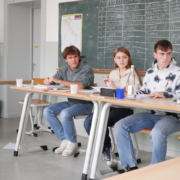NO to arbitrary! Debating team finishes South League with a final win
Last Friday our school’s senior debating team successfully defended their just merits at school opposing the given motion:
This House believes access to degree programmes at university should be handed out randomly rather than on the basis of final school grades.
And rightly so.
During preparation we were faced with at first unexpected but at the same time strong arguments for the case team proposition might use: One could have questioned the reliability and validity of school grades, especially between different schools, not to speak of different federal states. An argument not few Gagern students are painfully aware of when competing for grades on a high level in their classrooms and final examinations. Another main argument could have been the idea of reshifting the focus from a mere output of the best possible Abitur grade to a truly humanistic education of young men and women. A shift which most certainly would unleash potential and open up possibilites for teachers in their classes, counter the ongoing inflation of grades and most importantly would truly raise the academic level of lessons at school. No teacher would feel the pressure to „evaluate“ their own success with good grades on their students’ side and no student would have to focus on grades instead of their personal development when reading Goethe or Shakespeare.
Instead, we were faced with a move which has become all to common these days: team proposition tried to nuke us by pulling the privilege card. But this knee-jerk reaction was all too simple for our by now pretty experienced and confident debaters. The reality of privilege in our educational system is undeniable. But how would handing out degree programmes at random ensure that less privileged students would get the affirmative action they most certainly are entitled to? Which programmes instead are already implemented in our school system to fight the effects of privilege and how just would it be to deprive a bright young student of his academic career chances because of his family background? And, when it comes down to it, the nimby effect (not in my backyard): who do you want to operate on you? Someone who ambitiously worked up his way through school and university and showed his aptness for a career in medicine – or someone who got into medicine by a system that comes close to a lottery? And it goes without saying that more or less the same is true for your lawyer or the one who runs the company you are employed at.
The deciding factor, however, was once again our knowledge of Latin and thus knowing the ethymology of the very concept „Abitur“: A habit forming process at the end of which young, promising men and women are able to not only receive higher education but to take on the world, the academic world as well as the professional world, with a set of skills and values that enables them to succeed.
With this win the debating season is now over for this year and we are looking forward to participating again in next year’s debating season.
Special congrats go out to Chiara Spors, Matthias Durth and Tillmann Bier for their outstanding effort and achievement. Hear Hear!
Von Georg Probst





 Stiftung Polytechnische Gesellschaft/D. Buschardt
Stiftung Polytechnische Gesellschaft/D. Buschardt